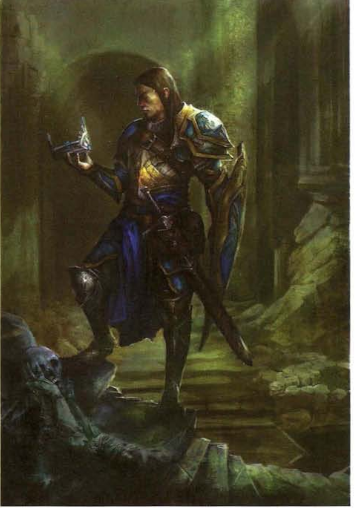Let's Read Neverwinter: Neverwinter Noble

Now that Neverwinter is on the way to being restored, Lord Dagult Neverember of Waterdeep has arrived to take control. He claims to be a distant relation of the old rulers of Neverwinter, and has declared himself Lord Protector of the city until “order is fully restored”. He’s backed by an army of mercenaries, and everyone expects him to crown himself king once he stamps out resistance to his rule and controls the whole city.
A lot of people suspect his claim to the throne is a lie. You are completely sure it’s bunk, because you are the true heir to the throne of Neverwinter.
You are the child of a noblewoman who escaped the city as it was being destroyed, shortly before you were born. She would succumb to her wounds and her grief shortly after having you, and you would be adopted by the Thann noble house in Waterdeep. You were given a proper noble education and consumed a steady diet of heroic poems and epics. They told you about your true heritage shortly after Dagult took over Neverwinter, and by the time the campaign starts you have decided to seek your birthright there.
This is a lofty goal, and a difficult one: you need strong allies, and the sort of conclusive evidence for your claim that can only be found in the ruins of the city. It’s up to you whether the other PCs know of your heritage or not.
Neverwinter Nobles must be at least part human, because the historical lords of the city were human. The powers suit melee defenders and give them a leaderly bent, but there are no hard class prerequisites. The background skills are Diplomacy and History.
Features
The level 1 feature is an extra encounter power named Take Heart, Friend!, which lets you use your lordly charisma to rally a comrade. It’s a minor-action encounter power that gives an ally within 5 squares a +2 power bonus to all defenses and 5/tier temporary HP. The “5/tier” bit means it would remain useful even after the projected level range for this campaign, which is a nice touch.
The level 5 and 10 features are less flashy, which follows the usual design formula for themes.
At level 5, when you flank an enemy your allies gain a +1 power bonus to attack that enemy. This does stack with the usual +2 bonus from combat advantage.
At level 10, you are probably close to claiming the throne and your regal mien is obvious for any to see. You gain a +4 bonus to Diplomacy when interacting with citizens of Neverwinter, and a +4 bonus to Intimidate against anyone who opposes your rule.
Utility Powers
These are not mandatory, as I’ve said earlier. Rather, they become additional choices alongside class powers whenever the PC would gain an utility power.
Honorable Challenge is a Level 2 encounter power that requires a minor action. It gives you an aura 2 that lasts a turn. Enemies inside take a -2 penalty to attack anyone other than you. In other words, it’s a wider Defender’s Aura that lasts for a single round.
Cover Your Ally is a level 6 encounter power. When an ally within 3 squares of you is attacked, and you are not a target of the attack, you can swap places with your ally as an interrupt, and become the new target of the attack. Castling!
Pillar of Lordly Might is a level 10 daily power. It’s a move action that gives you a +2 to all defenses and a +5 to Diplomacy, but also immobilizes you. This lasts for a turn but can be sustained with minor actions. Great for all those Thou Shall Not Pass moments, and it might even allow you to negotiate peace in the middle of a fight.
Impressions
I honestly don’t have a lot of skill at gauging the effectiveness of PC powers in 4e. These seem cool to me. They do work much better for melee defenders, and here they work equally well for Essentials and PHB classes. I like it that none of the powers involves attack rolls.
Regardless of the theme’s mechanical effectiveness, it gains major points for me because you get to become the ruler of Neverwinter if you follow the built-in story and succeed at it! Very few of the GMs I’ve known would just let a PC be the True Heir to the Throne if they asked it. Here, it’s just a character option anyone can take.
Technically, multiple characters in the party could take this theme. Perhaps the mother had twins, or perhaps you had multiple nobles who fled to Waterdeep with small or unborn children. This being 4e, I would not recommend using this as an excuse for deadly intra-party conflict. After all, Dagult Neverember is already there to provide proper opposition to the PCs. Rather, players of multiple nobles should probably agree on who has the actual claim to the throne and who “merely” stands to inherit an estate and become a trusted advisor to the monarch.